In this installment of Critical Hit – A Major Spoilers Dungeons and Dragons Podcast: They’re not Spite Orcs, they’re Random Orcs… Randorcs!
This episode is sponsored by Harrys.com. Use the code CriticalHit at checkout for $5.00 of your first order!
Visit the Major Spoilers store for Critical Hit and Major Spoilers merchandise!
- Direct Download (Right Click+Save As)
- RSS Feed
- Subscribe via iTunes
- Subscribe to the Major Spoilers Podcast Network Master Feed!
- Major Spoilers Podcast Network Master Feed RSS Feed
- Critical Hit on Stitcher
- Show your thanks to Major Spoilers for this episode by becoming a Major Spoilers VIP. It will help ensure Critical Hit continues far into the future!
Contact us at podcast@majorspoilers.com A big Thank You goes out to everyone who downloads, subscribes, listens, and supports this show. We really appreciate you taking the time to listen to our ramblings each week. Tell your friends about the podcast, get them to subscribe and, be sure to visit the Major Spoilers site and forums.
[signoff predefined=”PayPal Donation” icon=”icon-flag”][/signoff]3D Printed Game Pawns
Ever needed a band of monsters for your table top RPG, but didn’t want to confuse your players with lookalike figures? Stephen 3D prints a numeric pawns to k…



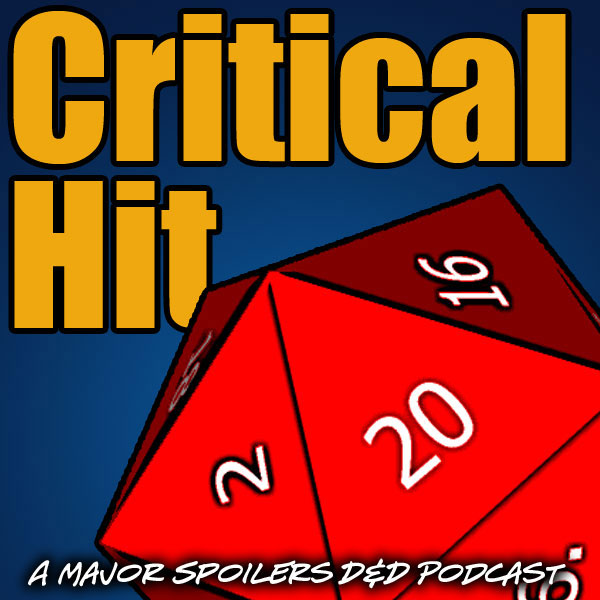



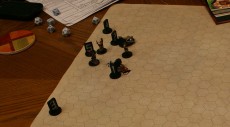
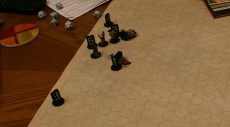
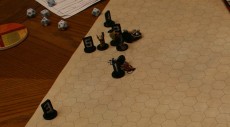
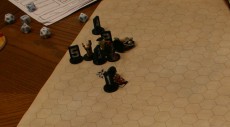
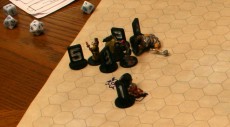
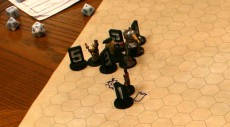
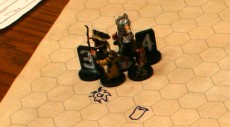
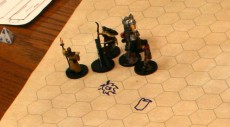
26 Comments
Matthew you definitely spoke about “every class is a wizard” when CH started. You didn’t seem to like it too much but IIRC you had the same kind of “I’m sure as I play I’ll get used to it” approach.
I think 5’s turns are much, much faster than 4’s. Not trying to throw stones but in some of the combat episodes turns could take 10-20 minutes and listening it was just hard to remember what was going on. Now it’s “roll to hit/roll for damage/next” and it’s a lot easier to listen to imo.
Third-level turns were quicker in 4E as well, if we go back to season one. I’m not sure the comparison of our 12/13/14 level powersets to this adventure is entirely fitting…
Mileage, as always, will vary.
I think the serious reduction of HP at starting levels also has a lot to do with it. Rodrigo talks a lot about tending to use skirmishers and lurkers in 4E because they hit hard but don’t have as much HP, so they die quicker, but also force the PCs to think a little more tactically. 5E’s smaller HP totals have a similar effect, which I think is good.
But yeah, it’s hard to compare Level 1 and Level 14 fights.
I think if you play higher level 5 character you’ll find it’ll still be faster, been my experience at least.
I think the DM styles of Rodrigo vs. Rob change the perceptions of time it takes for a combat encounter as well.
Rob allows much more table talk and digression than Rodrigo.
It would be interesting to compare a second-level fight from the original season of CH with this random encounter. In this episode the total time for combat was well under an hour. I wonder if a similar fight in the original CH with multiple monsters would be about the same. Of course, the first season had only 4 PCs , so that also needs to be taken into account.
Critical Hit episode 9 was an attack on a camp. The episode is 1 hour 44 minutes.
http://majorspoilers.com/2009/08/22/critical-hit-9-an-attack-on-the-camp/
Rodrigo also notes in the comment section of CH #9 how Torq deals huge damage all the time. That also is a big difference. With Matthew rolling 1s instead of 20s, the combat is going to take longer.
also half the people at the table hadn’t played DnD in years (or ever), so powers were still being explored.
But then, slowly, all the players learned the rules and didn’t need reminders again, right?
Right? :D
I’ve been calling myself a RanDork for years… (you misspelled that btw)
Thanks for the company while I walked to the train station to get to a volunteer gig at 5:30 in the morning. You guys are better than whiskey in keeping a person warm in below freezing temps!
Your bad luck is ours too. Good episode. A shame you end up spending two episodes fighting random encounters though. I hope you find your way back to the plot soon.
I noticed a couple mistakes, I hope you don’t mind 5e fans butting in with suggestions:
Rodrigo got concentration mechanics wrong. It doesn’t take your bonus action, or any action at all; you can concentrate on a spell freely, but you lose concentration if you use another spell that requires concentration or get hit hard enough. It’s not supposed to be a drain on your action economy, but on your ability to stack spells together. Check PHB pg. 203.
Rob was off on being prone. Check the conditions in Appendix A, and the section “Being Prone” on the bottom of page 190, both in the PHB. Short version: the orcs should’ve had advantage on you guys while you were prone, but standing up only costs “an amount of movement equal to half your speed,” so you could’ve moved half your speed after standing.
It also seems like you guys would probably like the game better with some of the optional rules in the DMG, but I bet people have already said that in previous episodes’ comment sections.
The Wotc website has the official artificer in the unearthed arcana article. Just sayin.
Edit; unofficial playtest-ish artificer? They are asking for feedback. ??
From my experience as a 5e GM:
That general squishiness goes away pretty quick, and is true of many level based rpgs. I recall Smith had a tendency to go down repeatedly. The interesting thing about 5e is it’s stratified into 5 layers every 4 levels. Within a layer accuracy doesn’t really change much, and damage ramps very little. This means 1 is very dangerous. 2 is kinda dangerous, but by lvl 3 your HP has increased to a nice level where you start to feel pretty safe. Looking ahead there is a similar curve 5-8 but you never get as squishy as you were at lvl 1&2.
Was far as healing goes, I think the issue is getting worsened by bad roles. Rob rolled abnormally well early, and Matthew rolled terrible all night. You have my greatest sympathy there. My players rarely need more then one heal in any given fight. Most of thier healing comes from rest mechanics. My cleric player (storm) casts maybe 60/40 damage spells/heals. A well placed Guiding Bolt or thunder wave saves a ton of healing. The bad guys seem to stay up a lot longer, thus get more hits in for you folks.
Finally, I enjoyed hearing the breakdown of play impressions at the end. I assume this episode is the end of a play session? It feels like it if not.
This one probably was at the end of our second session together playing 53.
I don’t want to sound like a broken record (since I’ve already commented about this in a past post for a past episode), but Matthew hit the nail on the head for the problem I see too many 4e players make:
“I’m a fighter so the only thing I have available to me is I hit with my hammer. It’s so boring compared to 4e where I have defined powers that are so cool and let me do all this crazy stuff!”
I want to scream every time I hear someone say that (or when people just stick to the power cards they have in 4e). As a fighter, you’re able to do all sorts of cool stuff because you likely have a high strength and a decent dexterity. You can push people around. You can pick things up and throw them. You can feint people. You can swing from chandeliers or vines. You can tip over bookcases. You can throw sand in someone’s eyes. And those are just the immediate ones that came to mind. 5e makes it easier to do these types of things because there are not power cards you have to look down at to think about what you want to do.
For example, in some of the games I’ve played in (both 4e and 5e, but it’s easier to do in 5e), we’ve done the following:
Pushed a burning cart into a group of kobolds.
Jumping over said burning cart delivering a axe to the face of a cultist.
Thrown a giant water barrel at a cultist at the bottom of a hill who was chanting some crazy ritual.
Jumped from cart to cart in chases, throwing baddies off the cart and dangling from behind it myself.
Used the tried and true fastball special with the halfling barbarian (me) who was carrying a barrel of oil into a group of goblins which was then detonated by the party wizard.
Having the rogue climb up the back of a giant and hang on for dear life.
Climb onto the back of a dragon who proceeded to take flight, causing quite the problem.
Really, these are just a few that were memorable and jumped to mind and you shouldn’t have to have a card or ability to do something. In m y experience, DM’s are excited to see it when a player asks “Yea, but can I…” and then proceeds to come up with some off the wall/crazy idea beyond “I hit him with my hammer.” I’ve never had a DM shoot down an idea because I didn’t have a specific power or ability for it. It usually comes down to, “Is this something that could possibly be done? Okay, roll X to see if you can pull it off.” You obviously know how hard something is going to be when you describe it, but making your own moves always has more of a pay off. It just takes looking BEYOND what you have written down in front of you to get the most out of a character. While these things are doable in both 5e and 4e, as I’ve said they are a little easier to do in 5e because of the mechanics. Call me crazy, but when the ideas start flowing, that’s when the great gaming happens.
Anyway, for combat 4e takes WAY longer. Any sort of fight in 4e would easily take 1 and a half to 2 hours. I’ve yet to come upon a combat in 5e at any level, even crazy boss fights with waves of guys being thrown at the PCs, that have taken over an hour. Not to mention that there usually isn’t the crap load of status effects and other riders that need to be managed. Most of the meaningful fights take between 20 and 40 minutes with the less dramatic ones usually taking less than 20 minutes. While I still like 4e, the bogged down combat always had me wanting more and was always my chief complaint.
+1
Isn’t most of that, “I hit it with my axe” with extra rolls for degree of difficulty? And maybe all that description and extra rolling what’s making combat go so long? In a system where “save or suck” is thankfully extinct, what ends combat is making the other side hit 0hp asap. Those powers with their single rolls and baked in status changes are the most efficient way to do that.
Also, after around seven years of edition warring, I am sick of being told by others that playing 4e as written is badwrongfun. At this point it’s really no longer necessary.
I might have misread your post. If so, my bad.
Upon rereading it seems like your frustration is 4e players treating 5e combat like 4e.
I don’t know if that’s a problem or not. So far all the 5e combats I’ve been in during the Theatre of the Mind game I’m in have basically been nothing but a series of 1on1 duels that went to the higher AC guy and left me really, *really* cold.
I suppose that’s what TotM is with big parties. Gods do I miss the grid and the statuses. We’ve yet to see advantage. I don’t remember the CH crew seeing much of it either.
I’m not trying to tell anyone how they should be playing anything. First and foremost, you do what you have fun doing. In my experience, it’s just been that people coming from 4e to 5e need a little more prodding into opening up and really cutting loose. To me, 4e was a very structured box. As long as you stayed in that box you were okay. On the other hand, 5e gives you a box and then encourages you to actively push it out of the way. I don’t want any player to have to think they can only do the things that they have abilities or power cards for. In an table top game it should never be the case that a player’s idea gets shot down out of hand just because. Not making sense or being plain stupid is a different thing entirely though.
I can’t comment on the edition war thing because the only real D&D experience I have is 4e and 5e, but for me, 5e is better on the whole. Sure each has its problems, but anything where I don’t groan when the minis come out is a win in my book.
The only game I’ve ever played without some sort of minis and map/board is the Dragon Age RPG. I’m not a fan of “Theater of the Mind” and prefer to have the visual representation as well as my imagination to back it up. Minis and some sort of map are always a must for me, even if they are only loosely used.
+1
“Are you angry?”
“Yeaa…”
“GOOOOD!”
Completely lost it right there. I want so badly for this Tiefling Bard to just snap and go full demon at the end of this adventure.
-Chad
I’m a bit late in responding here, but I absolutely loved that scene in this episode. Rodrigo does a great job adding flavor to his spells and other actions. This goes back to the start of CH when he, as DM, would ask players to describe their actions when they were using one for the first time. He needs no prompting when doing this as a player. Rodrigo continues to do it periodically to reinforce the flavor of in game actions. It’s just a little bit that makes the podcast so entertaining.
I’ve seen a bit of edition warring going on in the comments here, and this addition of flavor to actions is something that can be done regardless of edition, and I hope to see more of it in future episodes. Whether he adds this kind of flavor, engages players in roleplaying, or has players describe their characters at the start of each new season (and probably every few play sessions), Rodrigo really makes this podcast so much fun to listen to.
Hey guys, the Historical European Martial Arts nerd in me feels the need to point out:
Despite that it doesn’t do slashing damage in D&D, rapier blades have edges. They’re actually much bigger weapons than most people think they are. What don’t have edges are foils and epees.
http://www.medieval-weaponry.co.uk/acatalog/SH1099-1000.jpg
^That is a rapier, and as you can see, it’s got very sharp edges.
Then again, the classifications of longsword, short sword and broadsword are hardly accurate either. And don’t even get me started on glaives, halberds and pikes…
Thanks guys, another fun episode. Someone asked about flanking – as you probably know, there are optional flanking rules in the DMG.
I appreciated the breakdown discussion at the end, especially Rodrigo’s comments about healers and controllers. In my own campaign, healing mid-combat has generally only been required a few times, so it usually isn’t an issue. Our Wizard seems to enjoy casting web just as much as fireball.
Having heal and control happen as side-effects to strikes has always felt a bit gamey to me, but horses for courses.